“Gram:” A Photo Series
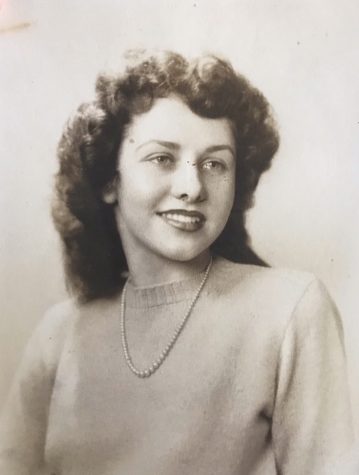
My grandmother’s name is Winnogen Whyte. Wyn, to most.
But I know her as “Gram” — when my older cousin was born, she decided that being called Grandma—or worse, Grandmother—made her feel too old, and thus coined herself with a shorter nickname.
She lives on Cape Cod—an arm-shaped piece of land that extends off Massachusetts into the Atlantic ocean. The cape is full of dreamy beaches preceded by grass-covered sand dunes and picket fences, and the water is always too cold on the ocean side. I’ve visited those beaches every summer that I can remember.
My grandmother rarely goes to the beach. She used to go more often when she was younger. When she was a young girl, like me, she’d splash in the water with her brother and cousins while her mother and aunts lounged upon beach chairs and gossiped. In her teenage years, she’d go down to the beach in the evenings with her friends and sit around drift-wood campfires. But she’s almost 90 now, and only sees the ocean once a year, when I come for part of the summer.
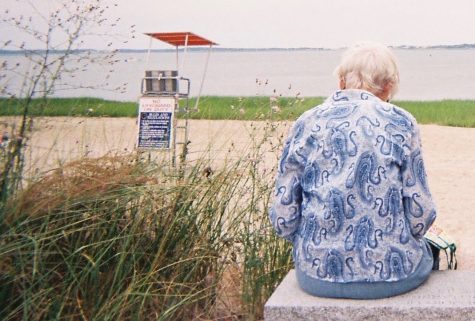 Gram at the beach
Gram at the beach
Instead, she spends her day busy in her gardens. She’ll go to the YMCA and do chair yoga and Tai Chi. She has her brunch group with my great aunt and her friends, and her fellow master-gardeners. She has her circle of older women that volunteer at the library down the street, where she picks up every edition of The New Yorker a week late—someone always donates their copies after they’ve been read. She keeps her body agile and she keeps her mind moving.
That was, until the COVID-19 pandemic spread across the globe, all the way into my gram’s little town on the east coast, with its one general store and tiny library, and her 10-minute drive to the beach. The library closed, followed by the YMCA. The master-gardening meetings at the greenhouse came to a halt, and the monthly brunches with my great aunt did too.
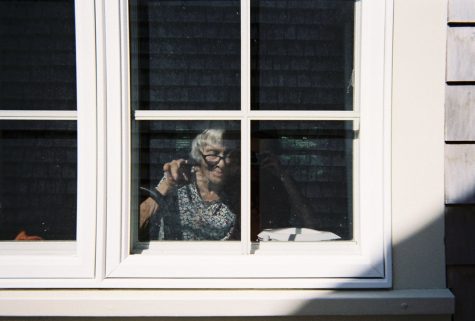
Through the window, washing carrots and beets in the kitchen sink
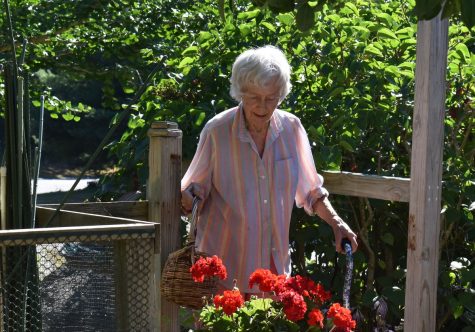
Since then, she’s started using a cane. It’s patterned with a pretty blue floral that matches many of her shirts. But she doesn’t really need it, or so she says. Her phone calls are shorter; she’s tired.
My grandmother’s life has changed throughout self-isolation. Things are quieter, simpler, and more lonely. She’ll eat dinner at 5 o’clock, sometimes at 4:30. It’s followed by a glass of wine (or two), and every now and then, some ice cream.

Chicken, rice, and snow peas for dinner
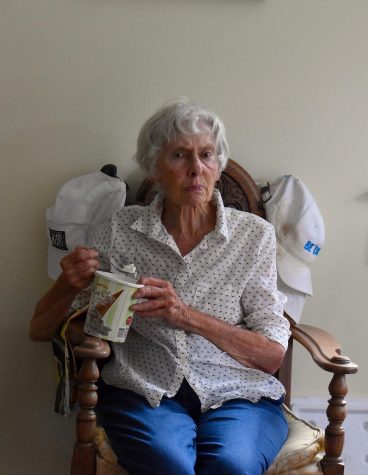
Caught in the act! Ice cream at 7 o’clock
She misses reading The New Yorker and says missing the issues has been one of the hardest things these past few months. The image of Gram reading the magazine in her favorite armchair is one that first pops into my mind when thinking of her. Now, that image is replaced with a picture of her with her face tinged by the blue light from her iPad, reading the daily news and COVID-19 updates.
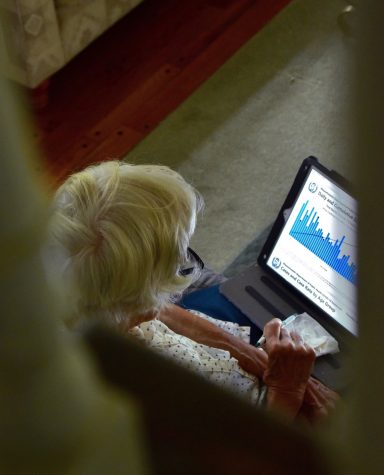
View from the staircase
Gram’s aging, and with that comes change, and perhaps that change is exacerbated now, but she’s still the person I know—she worries too much, she harps on me to improve my posture, she smiles when someone walks into the room, is ever-eager to spend time outdoors, notices the smallest, loveliest things, like a certain sweet smell in the air and each new bloom of a flower. She hangs up her laundry to dry like always, although it’s harder now with her hands knotted by arthritis. She says that washing too many windows with ammonia has caused it, and sometimes her fingers fumble and struggle to take hold of the clothespins.
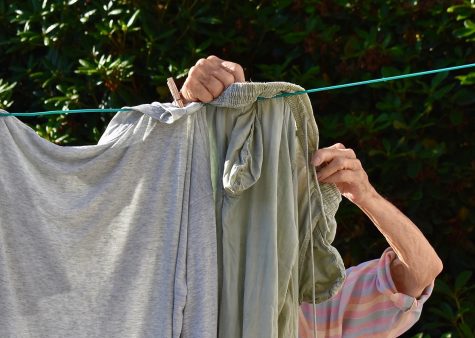
Hanging up the laundry
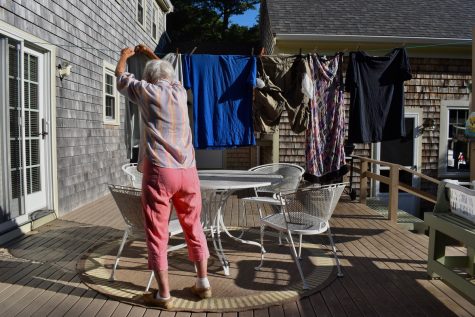
A bit of pink amongst grey
Summer’s end is quickly approaching, and soon my grandmother’s flowers will have wilted away and her vegetable garden will have stopped producing. The cooling weather is always hard for her, with the nip of frost and cold winds of the cape forcing her to stay indoors. The dreariness of the winter is punctuated with morning trips to the grocery store, browsing at the library and visiting with her circles of friends. Even so, every year in the wintertime she decides that perhaps the next spring she won’t plant a section of her garden, that maybe it’s time to slow down her movement, and yet every year she’s regained a bit of hope and continues on come springtime.
This year will be different. The impact of COVID-19 on the lives of the elderly—and my grandmother—has been of great magnitude, and continues to have drastic implications. The elderly compose one of the most at-risk groups, and so many are extra conscious of guidelines and protocols in order to stay safe. Like many others, my grandmother will forego meeting with her friends and will refrain from close contact and connection. But she’s nearing the end of her life, and connection is more important than ever. My grandmother is a vibrant, smart person. This coming winter and the isolation of it will have tangible, negative effects on not only her body and mind, but also her spirit. The future state of the pandemic is unknown, and there are still countless more challenges and losses ahead. Perhaps, as it has for my grandmother, the coming of springtime will help regain a bit of hope, if we can hold on until then.
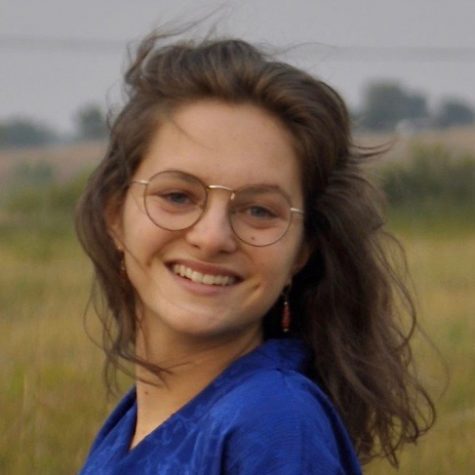
Clara Fraser is a senior this year and a staff writer for The Owl. Writing is something that Clara has always adored - as well as more artistic pursuits, which she hopes to further incorporate into aspects of her journalism. She looks forward to seeing how The Owl can develop in the coming year - and is excited about the prospect of it being a connecting factor between students during online learning. In her spare time, although usually taken up by wildly procrastinating, Clara enjoys avidly reading The New Yorker, spending time in the outdoor world (best if accompanied by good company or with her dog), and dabbling in various art forms. Throughout quarantine, Clara has developed a love of afternoon...

